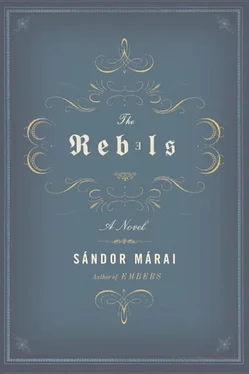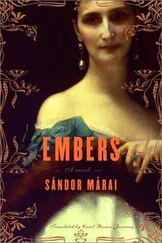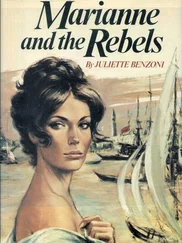He drew a greasy pack of cards from his pocket and threw it on the table.
“Tomorrow Prockauer goes to Havas. You’ll go whether you want to or not. The chains that hold you are strong. Don’t bother struggling. May God have mercy on you.”
He stopped. The words stuck in his throat. He looked around, frightened. His voice was quite different now, almost tremulous.
“I would have liked to be your friend. But I was always afraid that you’d tell me off for something. I mean, you did once. On account of the knife and fork.”
“That’s something you can learn,” Béla retorted furiously.
It was the first time he had said anything. They stared at him. He was embarrassed and looked down at his feet. The candle had burned right down. They could only see outlines in the darkness. Tibor silently stood up.
“Well, then,” he said, somewhat at a loss. “We could go now, I suppose. I can’t think why we should carry on sitting here. We know everything now. And the candle has almost gone out,” he added as if that sealed the matter.
“You go ahead,” croaked Ernõ. “I want everyone in front of me. I don’t want any of you behind me.”
He kept his hand in his pocket and moved away from the door. Tibor raised the candle and held it up to his face. He gave a silent cry. Ernõ’s face was so twisted, it spoke of such unknown, unbearable sorrow that Tibor had to take a step back.
“We should tidy up here, of course,” he muttered uncertainly as he stood on the threshold. “We should all take what belongs to us before we go. We can leave the costumes here,” he said, pointing to the pile of clothes. “I don’t suppose any of us will need them again. In any case the game is over.”
“What a pity, Tibor,” said Ábel, almost weeping and feverish. He hadn’t said a word until now. “Look around you. It will never be like this again.”
They descended the stairs on tiptoe, Ernõ bringing up the rear. He followed them down the short way to the ground-level guest room in a state of inexplicable terror, as if he were in the gravest danger, almost fearing for his life. His elbows were tight against his waist, his hands never leaving his pockets. Not one of the others said anything to him on this short journey, not then, nor later in the night. It was a considerable surprise to all of them when, later, they had to look for him.
IN THE LONG, ALE-SMELLING, FRESHLY LIME-WASHED bar all done up for the picnic, they discovered a surprisingly lively atmosphere. Considering the early hour, the party must have been in full swing for a while.
At a folding table set up in the corner, at its narrower, upper end, sat Moravecz, Gurka, and the headmaster. The new arrivals hadn’t expected to see Kikinday sitting on the headmaster’s right. The town clerk was sitting between the gym teacher and the art master, while his son, who had been their classmate, was seated opposite him, silent and nervous, out of place. Now and then he would stand up, go over to the counter, and throw back a glass of pálinka, so that finally, much to the father’s surprise—for as far as he could see his son had not touched a drop of alcohol all evening—he suddenly collapsed about midnight, showing every sign of alcohol poisoning. In the succeeding chaos somebody indicated that they should be on their way. Laying the boy on an improvised stretcher, the majority of them departed.
Those who remained, Kikinday, Gurka—the master of festivities, who employed formal courtesy to maintain a proper distance between himself and his ex-students despite the intimate atmosphere of the occasion—and Moravecz, drew closer together at the head of the table and permitted such students as still kept company with them in these late hours to join them. Ernõ spent the whole evening sitting silently beside the tight-lipped Gurka. When the gang and a few other hardy partying souls somewhat reluctantly accepted Moravecz’s invitation and the tipsy group moved closer to him, Ernõ stood up and left the bar.
Memories of this May picnic survived for several years, not only in the unwritten annals of the school but in the town at large. The general opinion was that it was one of the most successful graduation parties the venerable institution had ever organized.
Because of the unusual heat the assembled gentlemen had left the town in the early morning and, together with their students, had settled down in the shady, lantern-lit garden of The Peculiar before being sent running into the bar by the storm. Considering the airless and damp hall, the company, including the more moderate among them, rather surprisingly succeeded in drinking themselves into a party mood in the time the rain continued to fall, so much so that the various courses of the banquet, together with its customary toasts, tended to dissolve in a spirit of universal good humor. The effects of alcohol were amplified to an extraordinary degree by the intense heat. Feeling decidedly jolly, Kikinday beckoned over every young man who was liable for military service, felt his muscles, and addressed words of encouragement to them all regarding their shortened period of training, referring particularly to the one-armed one.
“It was Prockauer’s idea,” he kept repeating. “Where’s the one-armed Prockauer?”
Tibor, who represented the two-armed branch of the Prockauer family, politely informed him, more than once, that his elder brother was probably at their sick mother’s bedside. When this information failed to register on the well-oiled Kikinday’s consciousness, and when, within a few minutes, he began to call again for the one-armed Prockauer, Tibor fell silent. The gang was secretly of the opinion that Lajos had been delayed by the bad weather. The one-armed one tended to lie in bed during storms with a pillow over his head.
“There might be other reasons,” Ábel suggested anxiously.
Tibor pretended not to hear. After midnight when the hall emptied they set about serious drinking. They hadn’t had much real practice with drink and Ábel, who had a high fever, behaved out of character, speaking loudly, banging the table, and demanding to be heard. Tibor listened broodily, casting occasional dark looks here and there as if seeking someone, then bent over his glass. Béla tried to annoy Gurka. He sat down opposite him and would now and then lean over the table, screw up his eyes, and like an underprepared student hungry for knowledge demand to know the significance of this or that quotation from Tacitus. Ábel stood up with the glass in his hand and began to make a long feverish speech. No one paid any attention to him.
Round about three o’clock they went out into the yard. A shadowy figure stood there with a lantern in one hand and a big hooked stick in the other, a stick far taller than himself. He was in quiet conversation with the landlord. He approached them slowly, holding the lantern above his head, raising the enormous stick high with each step.
“Here they are,” he said and shone the light in their faces. “I was just looking for the young gentlemen. My comrade at the front, young Mr. Prockauer, asked me to look for you tonight.”
Now they recognized him and stood amazed. It was the cobbler.

“IT IS IN FACT THE YOUNGER MR. PROCKAUER Iwant,” said the cobbler in his normal steady manner despite the strangeness of the meeting. “Though if I understand the nature of the message correctly, it is addressed to all the young gentlemen.”
Tibor stepped forward.
“What news of my mother, Mr. Zakarka?”
The cobbler turned the lantern and the stick slowly towards him and gave a nod as he might to anyone asking an intelligent question.
Читать дальше













